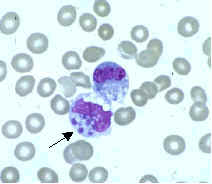Human monocytotropic ehrlichiosis
Editor-In-Chief: Prab R Tumpati, MD
Obesity, Sleep & Internal medicine
Founder, WikiMD Wellnesspedia &
W8MD medical weight loss NYC and sleep center NYC
| Human monocytotropic ehrlichiosis | |
|---|---|
| Synonyms | Human monocytic ehrlichiosis |
| Pronounce | N/A |
| Specialty | N/A |
| Symptoms | Fever, headache, malaise, muscle pain |
| Complications | Meningitis, respiratory failure, septic shock |
| Onset | 1 to 2 weeks after tick bite |
| Duration | Variable |
| Types | N/A |
| Causes | Ehrlichia chaffeensis |
| Risks | Tick exposure, outdoor activities |
| Diagnosis | Serology, PCR |
| Differential diagnosis | Rocky Mountain spotted fever, anaplasmosis, leptospirosis |
| Prevention | Tick bite prevention, protective clothing |
| Treatment | Doxycycline |
| Medication | Doxycycline |
| Prognosis | Generally good with treatment |
| Frequency | Rare |
| Deaths | Rare, but possible if untreated |
Human Monocytotropic Ehrlichiosis is a tick-borne disease caused by the bacterium Ehrlichia chaffeensis. This disease is primarily transmitted to humans by the Lone Star tick (Amblyomma americanum).
Symptoms
The symptoms of Human Monocytotropic Ehrlichiosis typically appear within 1-2 weeks following the bite of an infected tick. Symptoms can include:
- Fever
- Headache
- Muscle aches
- Chills
- Nausea
- Confusion
- Rash (occurs in approximately 30% of adults and up to 60% of children)
Diagnosis
Diagnosis of Human Monocytotropic Ehrlichiosis is based on clinical signs and symptoms, and can later be confirmed with specialized confirmatory laboratory tests. Treatment should never be delayed pending the receipt of laboratory test results, or be withheld on the basis of an initial negative laboratory result.
Treatment
The treatment of choice for Human Monocytotropic Ehrlichiosis is Doxycycline. Doxycycline is most effective at preventing severe complications from the disease if it is started early in the course of illness.
Prevention
Prevention of Human Monocytotropic Ehrlichiosis primarily involves avoiding areas where ticks are found and using insect repellents.
See Also
Transform your life with W8MD's budget GLP-1 injections from $125.
W8MD offers a medical weight loss program to lose weight in Philadelphia. Our physician-supervised medical weight loss provides:
- Most insurances accepted or discounted self-pay rates. We will obtain insurance prior authorizations if needed.
- Generic GLP1 weight loss injections from $125 for the starting dose.
- Also offer prescription weight loss medications including Phentermine, Qsymia, Diethylpropion, Contrave etc.
NYC weight loss doctor appointments
Start your NYC weight loss journey today at our NYC medical weight loss and Philadelphia medical weight loss clinics.
- Call 718-946-5500 to lose weight in NYC or for medical weight loss in Philadelphia 215-676-2334.
- Tags:NYC medical weight loss, Philadelphia lose weight Zepbound NYC, Budget GLP1 weight loss injections, Wegovy Philadelphia, Wegovy NYC, Philadelphia medical weight loss, Brookly weight loss and Wegovy NYC
|
WikiMD's Wellness Encyclopedia |
| Let Food Be Thy Medicine Medicine Thy Food - Hippocrates |
Medical Disclaimer: WikiMD is not a substitute for professional medical advice. The information on WikiMD is provided as an information resource only, may be incorrect, outdated or misleading, and is not to be used or relied on for any diagnostic or treatment purposes. Please consult your health care provider before making any healthcare decisions or for guidance about a specific medical condition. WikiMD expressly disclaims responsibility, and shall have no liability, for any damages, loss, injury, or liability whatsoever suffered as a result of your reliance on the information contained in this site. By visiting this site you agree to the foregoing terms and conditions, which may from time to time be changed or supplemented by WikiMD. If you do not agree to the foregoing terms and conditions, you should not enter or use this site. See full disclaimer.
Credits:Most images are courtesy of Wikimedia commons, and templates, categories Wikipedia, licensed under CC BY SA or similar.
Contributors: Prab R. Tumpati, MD


